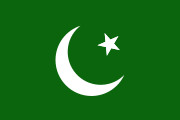
The Bangladesh Awami League, often simply called the Awami League or AL, is one of the major political parties in Bangladesh. The oldest existing political party in the country, the party played a large role in achieving Bangladeshi independence both before and after the Bangladesh Liberation War. As one of the two most dominant parties in the country, along with its archrival Bangladesh Nationalist Party, it has been the ruling party since 2009, and has since been described as authoritarian.

Sir Khawaja Nazimuddin was a Pakistani politician and statesman who served as the second governor-general of Pakistan from 1948 to 1951, and later as the second prime minister of Pakistan from 1951 to 1953.
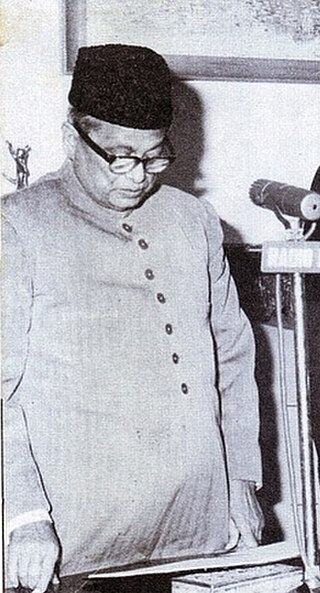
Nurul Amin was a Pakistani politician and jurist who served as the eighth prime minister of Pakistan from 7 December to 20 December 1971. His term of only 13 days as prime minister was the shortest served in Pakistani parliamentary history. He was also the only vice president of Pakistan.

Syed Mohammad Ali Chowdhury Bogra was a Pakistani Bengali politician, statesman, and a diplomat who served as third prime minister of Pakistan from 1953 to 1955. He was appointed in this capacity in 1953 until he stepped down in 1955 in favour of Finance Minister Muhammad Ali.

Huseyn Shaheed Suhrawardy was a Pakistani Bengali barrister and politician. In Bangladesh, Suhrawardy is remembered as a pioneer of Bengali civil rights movements, later turned into Bangladesh independence movement, and the mentor of Bangladesh's founding leader Sheikh Mujibur Rahman. He is also remembered for his performance as the Minister for Civil Supply during the Bengal famine of 1943. In India, he is seen as a controversial figure; indirectly responsible for the 1946 Calcutta Killings.

Abul Kasem Fazlul Huq, popularly known as Sher-e-Bangla, was a Bengali lawyer and politician who presented the Lahore Resolution which had the objective of creating an independent Pakistan. He also served as the first and longest Prime Minister of Bengal during the British Raj.

The Lahore Resolution, also called Pakistan Resolution, was written and prepared by Muhammad Zafarullah Khan and was presented by A. K. Fazlul Huq, the Prime Minister of Bengal, was a formal political statement adopted by the All-India Muslim League on the occasion of its three-day general session in Lahore on 22–24 March 1940. The resolution called for independent states as seen by the statement:
That geographically contiguous units are demarcated regions which should be constituted, with such territorial readjustments as may be necessary that the areas in which the Muslims are numerically in a majority as in the North Western and Eastern Zones of (British) India should be grouped to constitute ‘independent states’ in which the constituent units should be autonomous and sovereign.

East Bengal was a non-contiguous province of the Dominion of Pakistan. Geographically eastern part of the Bengal region, East Bengal existed from 1947 until 1955, when it was renamed East Pakistan. Today, the area is an independent country, Bangladesh. With its coastline on the Bay of Bengal, it bordered India and Burma. It was located close to, but did not share a border with, Nepal, Tibet, the Kingdom of Bhutan and the Kingdom of Sikkim. Its capital was Dacca, now known as Dhaka.

The East Pakistan Provincial Assembly, known as the East Bengal Legislative Assembly between 1947 and 1955, was the provincial legislature of East Pakistan between 1947 and 1971. It was known as the East Bengal Assembly from 1947 to 1955 when the provincial name was changed. The legislature was a successor to the Bengal Legislative Council and the Bengal Legislative Assembly, which were divided between East Bengal and West Bengal during the partition of Bengal in 1947. It was the largest provincial legislature in Pakistan. Elections were held only twice in 1954 and 1970.
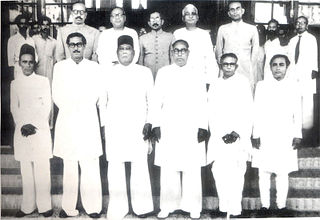
The United Front was a coalition of political parties in East Bengal which contested and won Pakistan's first provincial general election to the East Bengal Legislative Assembly. The coalition consisted of the Awami Muslim League, the Krishak Praja Party, the Ganatantri Dal and Nizam-e-Islam. The coalition was led by three major Bengali populist leaders- A. K. Fazlul Huq, Huseyn Shaheed Suhrawardy and Maulana Bhashani. The election resulted in a crushing defeat for the Muslim League. Veteran student leader of East Pakistan Khaleque Nawaz Khan defeated sitting Prime Minister of East Pakistan Mr. Nurul Amin in Nandail Constituency of Mymensingh district and created history in political arena. Nurul Amin's crushing defeat to a 27 years old young Turk of United Front effectively eliminated the Muslim League from political landscape of the then East Pakistan with United Front parties securing a landslide victory and gaining 223 seats in the 309-member assembly. The Awami League emerged as the majority party, with 143 seats.
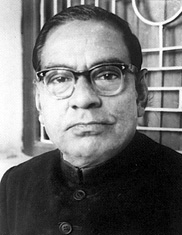
Abul Mansur Ahmad was a Bangladeshi politician, writer, and journalist.

Ataur Rahman Khan was a Bangladeshi lawyer, politician and writer, and served as Chief Minister of East Pakistan from 1 September 1956 – March 1958, and as the Prime Minister of Bangladesh from 30 March 1984 to 9 July 1986.

The history of East Bengal and East Pakistan from 1947 to 1971 covers the period of Bangladesh's history between its independence as a part of Pakistan from British colonial rule in 1947 to its independence from Pakistan in 1971.

The Krishak Sramik Party was a major anti-feudal political party in the British Indian province of Bengal and later in the Dominion of Pakistan's East Bengal and East Pakistan provinces. It was founded in 1929 as the Nikhil Banga Praja Samiti to represent the interests of tenant farmers in Bengal's landed gentry estates. Sir Abdur Rahim was its first leader. A. K. Fazlul Huq was elected leader in 1935 when the former was appointed as the president of the Central Legislative Assembly of India. In 1936, it took the name of Krishak Praja Party and contested the 1937 election. The party formed the first government in the Bengal Legislative Assembly. After the partition of British India, it was reorganized as the Krishak Sramik Party to contest the 1954 election, as part of the United Front. The coalition won the election and formed the provincial government in the East Bengal Legislative Assembly.

The Muslim League was the original successor of the All-India Muslim League that led the Pakistan Movement to achieve an independent nation. Five of the country's Prime Ministers have been affiliated with this party, namely Liaquat Ali Khan, Khwaja Nazimuddin, M. A. Bogra, Chaudhry Muhammad Ali, and I. I. Chundrigar. The Muslim League was defeated in the 1955 elections to the Constituent Assembly by a political alliance known as the United Front. However, Prime Minister C. M. Ali and Prime Minister Chundrigar were appointed to lead a minority government. The party was dissolved in 1958 after the declaration of Martial Law by General Muhammad Ayub Khan, the Commander-in-Chief of Pakistan Army.

The East Pakistan Renaissance Society was a political organisation formed to articulate and promote culturally and intellectually the idea for a separate Muslim state for Indian Muslims and specifically for the Muslims of Bengal. The organisation's founders and leaders included Abul Kalam Shamsuddin, the society president, Habibullah Bahar Chowdhury and Mujibur Rahman Khan.
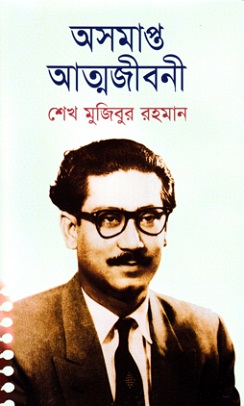
The Unfinished Memoirs is the autobiography by Sheikh Mujibur Rahman, Father of the nations of Bangladesh.
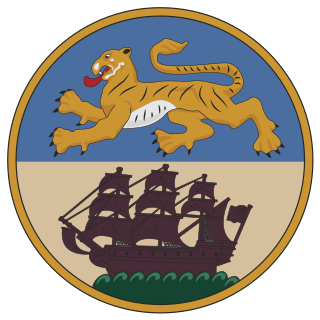
The Prime Minister of Bengal was the head of government of Bengal Province and the Leader of the House in the Bengal Legislative Assembly in British India. The position was dissolved upon the Partition of Bengal during the partition of India in 1947.

Abu Hussain Sarkar was a Pakistani Bengali politician and lawyer. He served as the fourth chief minister of East Pakistan. Under his ministry, the Bangla Academy was inaugurated and 21 February was recognised as Shohid Dibosh in memory of the Bengali Language Movement.

The Bengal Legislative Assembly was the largest legislature in British India, serving as the lower chamber of the legislature of Bengal. It was established under the Government of India Act 1935. The assembly played an important role in the final decade of undivided Bengal. The Leader of the House was the Prime Minister of Bengal. The assembly's lifespan covered the anti-feudal movement of the Krishak Praja Party, the period of World War II, the Lahore Resolution, the Quit India movement, suggestions for a United Bengal and the partition of Bengal and partition of British India.
